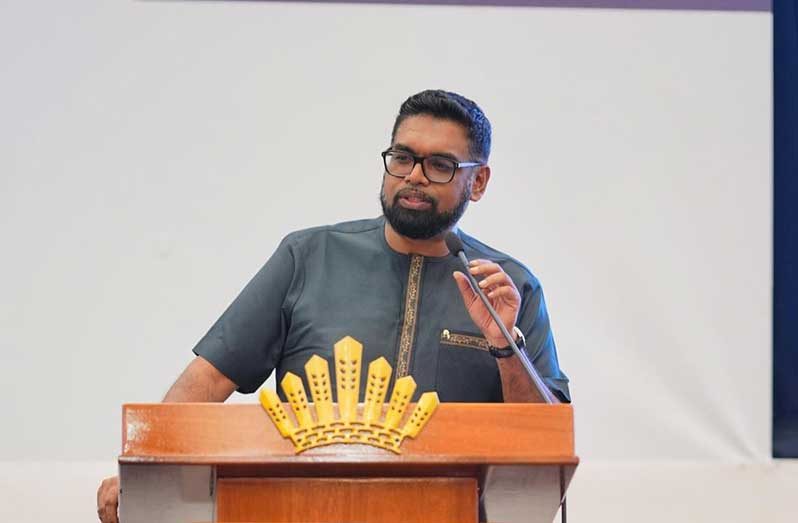stresses importance of digital learning for future generations
WITH significant advancements being made in technology in the Western world, President Dr Irfaan Ali has said that, for the Caribbean, focus must be placed on accelerating digital learning with the use of artificial intelligence (AI) as a tool for progress.
The Head of State made these remarks on Wednesday while delivering the keynote address at the 4th CXC Ministerial Summit under the theme ‘Artificial Intelligence and Technological Innovations in Shaping Caribbean Education.’
In this regard, President Ali noted that the Caribbean is already suffering from a digital gap, as the rest of the world has already accelerated their integration of advanced technologies. At the same time, our region has struggled with the advances.
He added that many schools in the Caribbean region still heavily rely on the traditional ‘chalk and talk’ method, with the shift towards digital learning being slower than necessary.
“This is a gap that we must close quickly,” he said while adding that the COVID-19 pandemic compounded the transition to digital education and this revealed how unprepared the region was for the shift to online learning.
This digital gap has implications for the ability to educate the next generation and, as such, President Ali posited that work must commence to build smarter classrooms and integrate technologies while also ensuring that teachers are effectively trained to operate in a classroom of the future.
He added, “This process would entail retrofitting schools to ensure more smart classrooms. The cost of installing smart classrooms can range from US$30,000 and upwards, so we are looking at a huge price tag but the cost of inaction will be far greater.”
Failing to adopt now, he indicated, means leaving students unprepared for a world that is increasingly shaped by technology.
While this may be very costly for many countries in the region that have limited fiscal space, Dr Ali noted that the cost of reducing the digital divide in education will create financial pressures on budgets but will represent an investment in future development.
ARTIFICIAL INTELLIGENCE
Meanwhile, as this push towards digital learning is imminent, Dr Ali indicated AI is a critical tool that should be used.
While AI, like other technological advancements, presents both challenges and opportunities, he told the summit of ministers and leaders in education that the task is to harness the potential of AI while addressing its risks.
Dr Ali added that there is a need to explore how AI and other technological innovations can help to address the issues faced in the region, like declining mathematics results, among other things.
He said, “AI and other educational technologies offer a range of opportunities that can transform how we teach and how students learn.”
Further to this, the Head of State posited that AI can also be a tool to help reduce the administrative burdens on teachers, allowing them to focus on what they do best, such as teaching and inspiring students.
Additionally, it also has the potential to revolutionise personalised learning and help educators tailor their instruction to the needs of each student, thus providing personalised feedback and identifying gaps in their understanding.
Dr Ali went on to note that the potential of AI extends beyond the classroom and offers new ways to think about education. Furthermore, by incorporating AI responsibly, students can be empowered to not just be consumers of technology but also achieve ethical development.
He expressed, “Let us focus on how we can accelerate digital learning, reduce the digital divide and make AI a tool of progress, rather than a source of fear. Our goal should be to prepare our students to thrive in a world where technology is evolving while ensuring that they remain critical thinkers capable of navigating a future of complexity and change.”
Consequently, President Ali said that educators must ensure that emerging technologies are introduced responsibly and ethically into the education system.
This, in turn, means that standards must be set for the use of AI in classrooms, developing guidelines for academic integrity in the digital age and ensuring that teachers are equipped.
“Ai should not replace the role of educators but should be seen as a partner that enhances their ability to connect with students and inspire a love of learning. The future of education in the Caribbean depends on the choices we make. It is in our hands to ensure that the promise of AI and technology becomes a reality that benefits every student in our unit to transform education,” Dr Ali told the summit.



.jpg)








